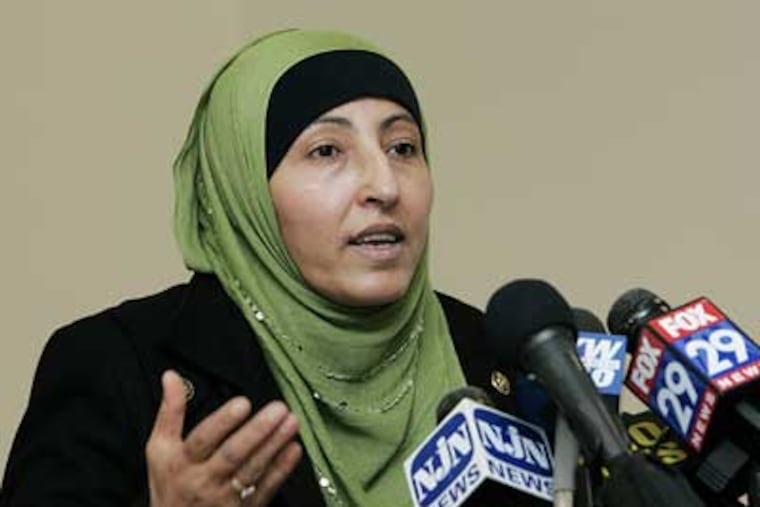Emotional family members question Ft. Dix verdicts
Family members of the five Muslim immigrants convicted yesterday of plotting a terrorist attack on Fort Dix angrily denounced the verdicts, claiming that rather than being blind, American justice had been distorted by paid FBI informants who lied on the witness stand.

Family members of the five Muslim immigrants convicted yesterday of plotting a terrorist attack on Fort Dix angrily denounced the verdicts, claiming that rather than being blind, American justice had been distorted by paid FBI informants who lied on the witness stand.
"This is not justice," Faten Shnewer, the mother of defendant Mohamad Shnewer, said moments after her 24-year-old son was found guilty of conspiring to kill U.S. military personnel.
Mohamad Shnewer is a U.S. citizen born in Jordan. Like the other defendants, he was raised in Cherry Hill, less than an hour's drive from the military base.
"Because they are Muslims, they are convicted," Faten Shnewer said of the five defendants.
"I know my brother," said a tearful Serpil Tatar, sister of defendant Serdar Tatar, 25, a legal immigrant from Turkey. "He is not a terrorist."
Other family members who had been in the packed fourth-floor courtroom declined to comment as they left the federal courthouse in Camden after the verdicts were announced.
Several were in tears. The younger brother of defendants Dritan, Shain and Eljvir Duka pounded his fist into a wooden hallway door along the courthouse corridor before being escorted out by security personnel. The Dukas, who immigrated illegally as children, are ethnic Albanians born in the former Yugoslavia.
The anonymously selected jury of eight women and four men issued a statement describing its deliberations as "one of the most difficult things we have ever had to do," but declined to comment further and turned down an opportunity to answer questions from reporters.
At the Islamic Center of South Jersey in Palmyra, where the Dukas and Shnewer worshipped, reaction to the verdicts was guarded.
"Even though we have freedom of speech, it doesn't mean a destruction of things should be spoken about," said Noor Mohammad, secretary of the mosque.
More critical were Muslim leaders elsewhere in New Jersey, who responded to the verdicts by focusing on some of the same issues raised by family members and defense attorneys.
"Many . . . in the Muslim community will see this as a case of entrapment," said Jim Sues, executive director of the New Jersey chapter of the Council on American-Islamic Relations. "From what I saw, there was a significant role played by the government informant."
Family members took issue with both paid FBI informants, Egyptian-born Mahmoud Omar and Besnik Bakalli, an ethnic Albanian.
Omar, who has a conviction for bank fraud and faced possible deportation, began cooperating with the FBI in March 2006 as the investigation into the Fort Dix plot began.
He recorded dozens of conversations, most with Shnewer, and accompanied Shnewer on trips to surveil military bases, including Fort Dix and the McGuire and Dover Air Force facilities.
The defense argued that Omar, who was paid more than $240,000 in wages and expenses, and Bakalli, who received about $15,000, manipulated the defendants into talk of a conspiracy that they had no intention of carrying out.
"Everybody says words. It doesn't mean they're going to do anything," Faten Shnewer said at a posttrial news conference.
Mohamad Shnewer is the only son among her six children. One of her daughters is married to Eljvir Duka.
Faten Shnewer and her husband, Abraham, who were born in Jordan, run an ethnic food market in Pennsauken. Mohamad Shnewer worked in the family food store and drove a taxi. He also briefly attended community college.
On tapes introduced as evidence, Shnewer talked repeatedly about jihad, praised Osama bin Laden and the "brothers" who launched the 9/11 attacks, and proudly showed Omar videos he had downloaded onto his laptop.
The tapes included radical Islamic speeches, videos of suicide missions launched by mujahideen in Iraq, and pictures of beheadings.
Faten Shnewer said "anybody can watch videos" taken from the Internet and insisted that Omar "pushed" her son into making incriminating statements.
Serpil Tatar, fighting back tears, said her brother had tried to contact the FBI through the Philadelpia Police Department after meeting Omar.
She said the FBI put him off because it had already decided to target him and the others in the Fort Dix case and did not want to disclose the fact that Omar was working for the agency.
"My brother cried for the people who died in 9/11," she said, "and for the people who died in Iraq."
Tatar came to the United States as a child with his parents from their native Turkey. Tapes played during the trial included conversations in which he discussed how he was hoping to get his citizenship papers and run a convenience store. He was an assistant manager at a 7-Eleven store in Philadelphia at the time of his arrest in May 2007.
Tatar went to the police, his sister said, "because he was afraid something was going to happen."
But evidence also included testimony that Tatar supplied Omar with a map of the Fort Dix complex taken from the pizza shop his family operated just outside the base.
Serpil Tatar said her brother did that reluctantly, and only after the FBI failed to respond.
"Why would he go to the police" if he were planning an attack, she asked. "He thought this guy [Omar] was the real terrorist."
Now, she said, Omar and Bakalli "are rich" and her brother is facing life in jail.
"I want to see proof in my hand," she said. "I believed in justice. . . . We came here because of justice, to go to school, to live better. . . . What I saw, there is no justice."